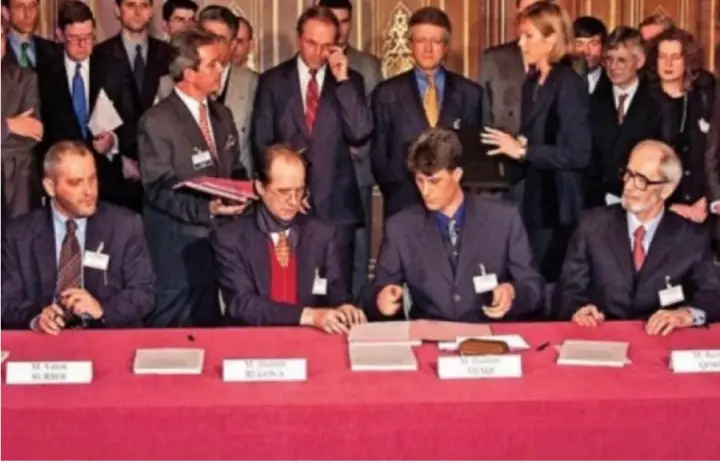Rambouillet, Vienna, Brussels — three cities, three peace efforts, three defining stages in Kosovo’s modern history. The first two shaped the birth of the Kosovo state, while the third — the Brussels dialogue — continues to stagnate, failing to normalize relations between Kosovo and Serbia despite over a decade of negotiations.
From Peace Talks to Political Stalemate
The Rambouillet (1999) and Vienna (2006–2007) negotiations ended the war and paved the way for Kosovo’s independence, even as Serbia rejected both processes. In contrast, the Brussels dialogue, launched in 2011 under EU mediation, was intended to bring normalization. Yet, fourteen years later, it has produced no substantial progress.
The talks began on March 9, 2011, led by Edita Tahiri for Kosovo and Borislav Stefanović for Serbia. While early agreements covered technical issues such as freedom of movement and border management, the process soon evolved into political negotiations. The first high-level meeting between Hashim Thaçi and Ivica Dačić in October 2012 produced the Brussels Agreement (2013) — hailed by the EU’s Catherine Ashton as “a step closer to Europe.”
“This is a step away from the past and a step closer to Europe,” Ashton said at the time.
However, twelve years later, Kosovo remains the only Western Balkan country not granted EU candidate status, and Serbia hasn’t opened a new accession chapter since 2021. Most agreements reached remain unimplemented.
Rising Tensions and the Breakdown of Trust
The dialogue hit a low point after the Banjska attack in 2023, when a group of armed Serbs killed a Kosovo police officer. The incident deeply strained relations. Prime Minister Albin Kurti has since refused any high-level meetings with Serbian President Aleksandar Vučić, demanding the extradition of the suspect Milan Radoičić.
“As long as Radoičić and his group remain free and protected in Serbia, there can be no trust in the normalization dialogue,” Kurti said.
Kurti accuses Serbia of acting like “a second Belarus” in Europe, aligning closely with Moscow, while Vučić continues to insist that Serbia “will never recognize Kosovo’s independence.”
Experts: Brussels Lost Its Direction
Former diplomat Ylber Hysa, who took part in the Rambouillet and Vienna talks, argues that Serbia’s obstructionism remains unchanged — while the EU has lost its ability to drive results. He criticizes Kurti’s hesitant approach, saying the current generation of leaders lacks the courage and persistence that secured Kosovo’s independence.
“Kurti wanted to buy time, fearing that any concession could damage his image as the only leader opposing international dialogue. But that hesitation cost Kosovo momentum,” Hysa said.
Analysts like Aleksandar Popov from the Center for Regionalism in Novi Sad agree that both leaders have little incentive to move forward. Kurti has consolidated authority in northern Kosovo, while Vučić faces mass anti-government protests at home.
Geopolitical Fatigue and Western Division
Experts including Marc Weller, Kosovo’s legal advisor during the Rambouillet and Vienna negotiations, warn that today’s Western disunity is a major setback. During those earlier peace processes, the EU and the U.S. acted as one — but that unity no longer exists.
“Today, pressure once again falls on Kosovo to make concessions, but no one knows if Serbia will honor its commitments afterward,” Weller noted, calling for a “new beginning” and a balanced Western approach.
He also warned that the return of the Trump administration could create unpredictable dynamics, given the involvement of former envoy Richard Grenell, who Kurti has accused of meddling in Kosovo’s internal politics.
Stuck in Political Limbo
With no fresh momentum from Washington or Brussels, and growing regional instability, the Kosovo–Serbia dialogue risks becoming a frozen process.
“The model that worked — transatlantic unity and domestic consensus — no longer exists. That’s why progress is unlikely under current conditions,” concluded Hysa.
For now, the absence of new developments may ironically be the best outcome — a fragile peace preserved by inertia rather than diplomacy.







